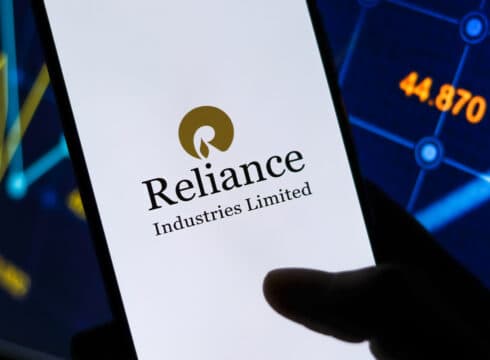The oil-to-telecom conglomerate unveiled its swappable and multipurpose battery storage technology for EVs at the Renewable Energy India Expo 2023 in Greater Noida on October 4
The batteries can be swapped at Reliance's battery swap stations or recharged using rooftop solar panels
In its 2023 AGM, Reliance shared its plans to set up a battery gigafactory by 2026
Inc42 Daily Brief
Stay Ahead With Daily News & Analysis on India’s Tech & Startup Economy
Marking its entry into the country’s burgeoning electric vehicle (EV) space, the oil-to-telecom conglomerate unveiled its swappable and multipurpose battery storage technology for EVs at the Renewable Energy India Expo 2023 in Greater Noida on October 4 (Wednesday). These swappable and multipurpose batteries can also be used to power household appliances through an inverter.
As per a Reuters report, the idea behind the move is to enable people to use a single battery for mobility as well as power appliances at home. The batteries can be swapped at Reliance’s battery swap stations or recharged using rooftop solar panels, which will be sold by the conglomerate.
However, so far, there is no clarity as to when the company will start selling these batteries. Inc42’s email to Reliance, seeking clarity on its next move, did not elicit any response until the time of publishing this article.
The introduction of battery storage solutions is part of the conglomerate’s $10 Bn green push towards New Energy – the company’s clean energy projects. Reliance also plans to achieve net-zero emissions by 2035.
In its 2023 AGM, Reliance shared its plans to set up a battery gigafactory by 2026. Notably, it secured the Central government’s backing last year, under the Production-Linked Incentive (PLI) scheme, to set up a 5-gigawatt hours (GWh) battery manufacturing facility.
“Our concurrent priority is to set up our battery gigafactory by 2026. It will manufacture battery chemicals, cells and packs, leading all the way up to containerised energy storage solutions, and will include a battery recycling facility to deliver a truly integrated ecosystem,” the company said.
“We will start with LFP (lithium iron phosphate) chemistry, which has been proven at scale for its safety, stability, and life, targeting to produce LFP-based solutions at world-beating lifecycle costs. Simultaneously, we are focussed on fast-track commercialisation of our sodium-ion battery technology,” the company added.
In 2021 and 2022, Reliance acquired two battery companies – Faradion and Lithium Werks, the makers of sodium-ion batteries and LFP batteries, respectively. Interestingly, the batteries showcased at the exhibition were LFPs.
A company presentation at the event showed that Reliance was also working on customisable batteries for business and individual usage, intelligent swap stations and integrated charging networks. Although Reliance doesn’t plan to venture into EV manufacturing, it is willing to join hands with EV makers, the company revealed in its presentation
Meanwhile, Reliance’s entry into the nascent battery and cell technology market will likely increase competition for startups that have just started sprouting in the space. From Ola Electric to the likes of Exponent Energy, EMO Energy, and Log9 Materials, several of these startups will now compete with the Goliath that is Reliance.
{{#name}}{{name}}{{/name}}{{^name}}-{{/name}}
{{#description}}{{description}}...{{/description}}{{^description}}-{{/description}}
Note: We at Inc42 take our ethics very seriously. More information about it can be found here.


